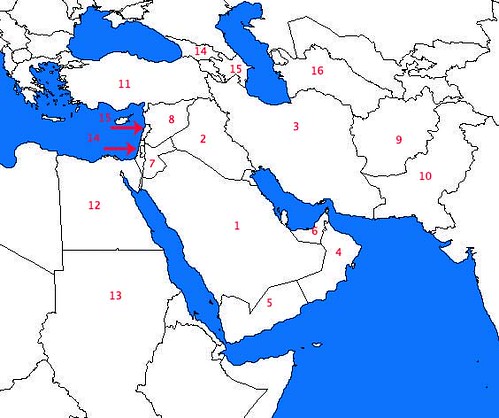Dignan is more wrong than usual
Apparently, my post about the uselessness of Geography as trivia has caused Dignan some sleepless nights. It even garnered 8 comments here at Page 132. I suppose it could be worse. Others have taken that post to mean I'm indoctrinating students with my political/social agenda. Of course, kumar takes the cake when, after admitting not reading my post, he hopes I get out of education because "given what he says he does and values, why even call it education?"I would recommend Dignan and timothy to read my post again. kumar might try it for the first time. I never argued that facts weren't important or that they shouldn't be taught. Let's quote directly from my first post:
Please note that I am not arguing that Geography shouldn't be taught. Heck, I'd be out of a job.Later in my post, I buttressed that statement with "Should we teach more than the bare minimum? Absolutely, but that doesn't mean everyone will retain all the information."(emphasis in the original)
The main thrust of my post was this line:
My only point was that adults aged 18-24 don't need to know this sort of knowledge, so they don't remember it.
I did seem to blow off knowing exactly where states were located and Dignan takes me to task for that.
Knowing where states are or where important countries are IS very important. Take Israel for instance. Without knowing that Israel is surrounded by Arab countries and knowing how tiny it is, much of the geo-political discussion of the Middle East loses understanding.

Let's take a quick test. According to the Roper study (PDF-pg 57), students were handed a map of the Middle East and asked to respond with the correct number of several countries (Israel, Iran, Iraq, Saudi Arabia). On my map, Israel is 14. Let's assume a student knows all the above information that Dignan says is so important, but confuses it for Lebanon (15). Guess what registers on the survey? Student doesn't know where Israel is. Considering how the survey was organized of the 510 young adults, we don't know the extent to what they knew ABOUT Israel, only if they knew its exact location on a blank map.
To prove my point about "important knowledge" versus daily useable knowledge, I then went on to offer some questions that we should all know. Questions ranging from physics to literature to biology to history. Dignan even admits that he doesn't know the answer to the Romeo and Juliet question, but covers his tracks with "No. But I KNOW what Romeo and Juliet is about and understand it as a wonderful piece of literature. That is the difference between knowing and memorizing."
Not so quickly there Dignan. According to how the Roper study was organized, you know NOTHING about Romeo and Juliet. Let the lamenting about the lack of knowledge of the Classics begin.
Obviously, that is BS. Dignan is an intelligent man with a clear understanding of Romeo and Juliet and could probably paraphrase the whole thing. He might even have memorized 2 (or more lines) at one time. He simply can't remember two lines when asked to do so today. Why? Because he probably hasn't been asked to do since he was 16. He's forgotten. It just isn't important in his day-to-day life.
Memorizing has that problem. You memorize facts, but learning is much more than simply swallowing facts. To get beyond the memorizing, if you remember, I offered up two geography-based subjects that would require students to learn rather than memorize. I suggested a study of Israel's aquifer and Sudan's desertification to make the facts important, applicable and worth remembering. To move students' learning from memorization to application, analysis and evaluation.
I don't really think Dignan and I are that far from each other on this. He and I both agree that the basics of all subjects should be taught. We both believe that students should know more about Geography. We just don't see eye-to-eye on what everyone will remember later in life.
I don't remember everything I was taught in school. Maybe Dignan and others do. If so, I'm jealous because I wish I did. For others like me, we only remember what we use. If we don't use the location of Ohio on a regular basis (or speed of light, or Romeo and Juliet or whatever), we won't remember it. I don't think this statement is so earthshaking that people should worry about my indoctrination of students, my professionalism, or the state of education in America today.
Technorati Tags: Current Events, Education, News
